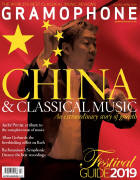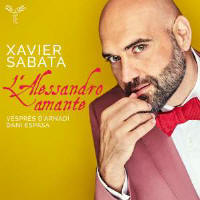Texte paru dans: / Appeared in: |
|
 |
Outil de traduction (Très approximatif) |
|
Reviewer: Tim Ashley Xavier Sabata has taken Alexander the Great as the subject of his latest recital, a carefully programmed and finely executed disc, as one might expect from a singer whose work has always combined beauty, intelligence and psychological perception in equal measure. It is not intended as a character study. More operas, Sabata reminds us in a booklet note, were written about Alexander the Great in the 17th and 18th centuries than any other historical figure, and what Sabata gives us tells us as much, if not more, about the complex responses to Alexander on the part of Baroque composers as it does about the man himself. The title, derived from a lost opera by Giovanni Antonio Boretti, is in some ways ambiguous. Not all the arias are sung by Alexander himself, which allows Sabata to observe him from within and without, both as lover and beloved, though the idea of love itself extends here beyond the private sphere to embrace the avidity of conquest and a passion for empire. The historical Alexander was bisexual, which permitted composers free rein with the resulting ambivalences. In L’Euleo festeggiante nel ritorno d’Alessandro Magno dall’Indie, Bononcini presents him as an object of male desire in ‘Da tuoi lumi’, sung by one of his cavalry officers, but as himself desirous of women in the reflective ‘Chiare faci’. Arias from Poro by Porpora and Handel view Alexander from a respectful distance, the former excited by his prowess as a warrior, the latter as seeking love after the heat of battle. Elsewhere, desire and politics intersect in very different settings by Pescetti and Vinci of ‘Serbati a grandi imprese’ from Metastasio’s Alessandro nell’Indie, and the dithering, conflicted hero of Handel’s Alessandro is nicely contrasted with his courtly, refined counterpart in Leo’s Alessandro in Persia. Sabata sings this complex programme with his customary elegance and flair. His dark, warm alto has always sounded good in slower arias, where the long lines flow with ease and his breath control is exemplary. ‘Chiare luci’, his voice hovering dreamily over Bonocinci’s rapt instrumental counterpoint, is ravishing, while Pescetti’s ‘Serbati’ finds him at his most eloquent as private regret and public duty contend within Alexander’s mind. His coloratura, always placed at the service of characterisation or drama, can be spectacular. The florid lines and erratic syncopations of Handel’s ‘Vano amore’ hint at self-dramatisation as well as confusion, while Porpora’s ‘Destrier ch’all’armi usato’, with its vertiginous plunging and rearing between chest and head voices, is a thrilling portrait of a charismatic man of action. The Barcelonabased Vespres D’Arnadí, meanwhile, play with terrific precision and élan for Dani Espasa, and the close recording adds to the immediacy of it all. A wonderfully accomplished recital, and highly recommended. |
|




